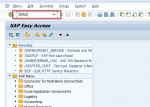What is SAP BO? SAP BO Training Tutorials for BeginnersSAP BODS Full Form & MeaningSAP BODS Certification CostSAP BODS Custom FunctionsODBC SQL Server Driver ConnectionOpen ErrorSAP BO Data Foundation & Business Layer
BO (Business Objects) Tutorial
 WIS 10901 A database error occur 'ODBC SQL Server Driver ConnectionOpen'
WIS 10901 A database error occur 'ODBC SQL Server Driver ConnectionOpen'
ODBCINI Parameter Mis-Typed in .profile fileA database error occurred while creating Web Intelligence Report. The database error text is: [SAP Busines ... SAP BODS Certification Cost and Course Duration in India
SAP BODS Certification Cost and Course Duration in India
SAP BODS (Business Objects Data Services) CoursesThe courses involved with SAP BODS are highly composite in nature and deal with a wide range of topic ...- Create Custom Function in BODS
Answered
How to Create Custom Function in BODS?Hi,I'm a newbie to Data Services and want to create a custom function for to check for special characters in ...  Differences between Data Foundation LoV and Business Layer LoV
Differences between Data Foundation LoV and Business Layer LoV
Data Foundation LoV vs Business Layer LoVData Foundation LoV(List of Values)The data foundation LoV can be based on: Static values Custom SQLThe table ...- Featured Content For SAP Postalsoft
SAP Postalsoft explained in details – Featured Content For Postalsoft:1. SAP Business Aims to End of life – Postalsoft – Solutions f ...  Define Order of Priority for BOM Usage
Define Order of Priority for BOM Usage
In this SAP BO tutorial, you will learn the step-by-step procedure to define the order of priority for BOM usage with proper screenshots. What ... What is SAP BODS (Business Objects Data Services)?
What is SAP BODS (Business Objects Data Services)?
Definition or Meaning - What is SAP BODS?Full form or SAP BODS stands for (Business Objects Data Services), used for pulling data from warehouses and ... Difference between Crystal Reports and Crystal Server
Difference between Crystal Reports and Crystal Server
SAP Crystal Reports vs SAP Crystal ServerWhat is the difference between Crystal Reports and Crystal Server?SolutionThere are two selections SAP C ...- License types for SAP Business Objects Products
License Types (NUL, CAL, CS, CSBL, CPU) for Business Objects ProductsThere are three types of user licenses available with SAP Business Inte ... - Difference between lookup(), lookup_ext(), and lookup_seq()
In this SAP BODs tutorial, we will explain what is lookup(), lookup_ext(), and lookup_seq() and the difference between their functions. lookup(): ...
1
×